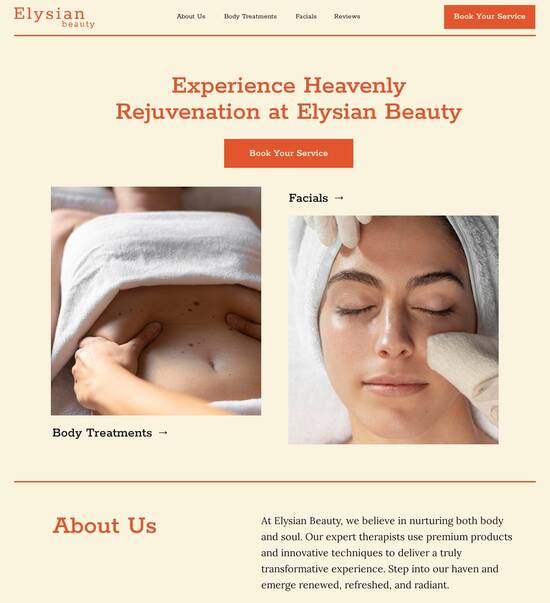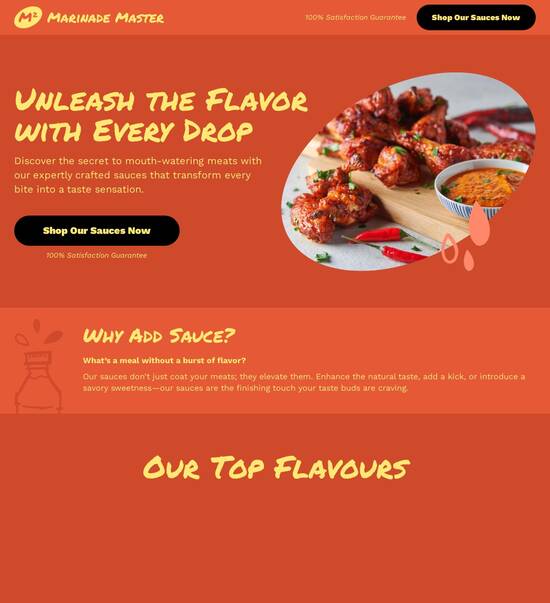
PHP optimized portfolio page template
Explore Similar TemplatesAbout template
Supercharge your portfolio page with PHP for outstanding performance! Learn more today.
Recommended templates

Easy to build without coding
With the intuitive drag-and-drop builder, anyone on your team can create high-converting pages without any knowledge of code or design. Make enhancements to your landing page with custom widgets using Javascript, HTML/CSS, or third-party scripts.

Multiple layouts for any industry and goal
Select from 500+ landing page layouts built to boost conversions across industry-specific scenarios. Customize them by adjusting fonts, adding images, and generating on-brand content with the AI assistant. Quickly scale with Instablocks® and Global Blocks that you can save, reuse, and update globally.

Loads fast and looks polished on any device
Every template is responsive, which means they present professionally on any device and load blazingly fast with our Thor Render Engine. You can also power them up with Google AMP technology to deliver an unparalleled mobile experience and drive higher conversions.

Robust analytics & experimentation
Get real-time updates and reporting across all your devices, showing the number of visitors, conversions, cost-per-visitor, and cost-per-lead. Launch AI-powered experiments, run A/B tests, and use heatmaps to analyze user behavior, then optimize your landing page to maximize conversions.







Easy to build without coding
With the intuitive drag-and-drop builder, anyone on your team can create high-converting pages without any knowledge of code or design. Make enhancements to your landing page with custom widgets using Javascript, HTML/CSS, or third-party scripts.
Multiple layouts for any industry and goal
Select from 500+ landing page layouts built to boost conversions across industry-specific scenarios. Customize them by adjusting fonts, adding images, and generating on-brand content with the AI assistant. Quickly scale with Instablocks® and Global Blocks that you can save, reuse, and update globally.
Loads fast and looks polished on any device
Every template is responsive, which means they present professionally on any device and load blazingly fast with our Thor Render Engine.
Robust analytics & experimentation
Get real-time updates and reporting across all your devices, showing the number of visitors, conversions, cost-per-visitor, and cost-per-lead. Launch AI-powered experiments, run A/B tests, and use heatmaps to analyze user behavior, then optimize your landing page to maximize conversions.
All the features you need to build lead-generating landing pages
Explore more featuresLearn how to build top-performing landing pages for any goal
FAQs
Leading the way in building high-performing landing pages





A comprehensive guide to using Instapage for enhancing your landing page effectiveness
In today's highly competitive digital landscape, optimizing your landing pages is crucial for maximizing your marketing results. Instapage provides a robust platform designed to assist businesses across various sectors, including marketing, education, and financial services, by enabling them to create high-converting landing pages easily. This step-by-step guide will walk you through the process of leveraging Instapage's powerful features to effectively boost your campaigns and improve ROI.
Understanding the power of landing pages
Landing pages are pivotal in capturing leads and driving conversions. With Instapage, businesses can utilize more than 100 customizable templates that are tailored for different verticals. These templates are designed to be user-friendly and conversion-focused, allowing you to maintain brand consistency while accelerating page production.
- Conversion-focused design: Templates are built with proven elements that drive higher engagement.
- Flexibility: Easily customize templates without needing programming knowledge.
- Speed: Launch your landing pages quickly to capitalize on timely marketing opportunities.
Optimizing landing pages for maximum impact
Optimization is critical in ensuring that your landing pages yield the highest possible conversion rates. Instapage includes built-in experimentation features, allowing you to A/B test various elements of your pages to determine the most effective configurations.
- Heatmaps: Analyze where visitors are clicking the most to enhance user experience.
- A/B Testing: Experiment with headlines, images, and calls to action to find the best-performing variations.
- Analytics Dashboard: Use real-time data to monitor performance and make necessary adjustments.
Harnessing personalization to engage audiences
Personalizing content can significantly increase engagement rates. Instapage empowers you to tailor experiences based on specific audience segments with features like dynamic text replacement and AdMaps.
- Dynamic experiences: Customize messages for different audience demographics in real-time.
- Ad alignment: Match your ads to the respective landing pages for a seamless user journey.
- Performance tracking: Utilize data tools to evaluate how personalized content affects metrics.
Collaborative efforts to streamline landing page creation
Collaboration among marketing teams is essential for producing high-quality landing pages efficiently. Instapage offers features that facilitate instant feedback, allowing team members to make real-time edits and share pages securely with external stakeholders.
By implementing the strategies outlined in this guide, you can maximize the effectiveness of your digital marketing campaigns using Instapage. Whether you’re part of a large team or working independently, Instapage’s user-friendly tools are equipped to handle your needs.
Ready to elevate your marketing game? Start using Instapage today to craft powerful landing pages that convert and connect with your audience!
People also ask about PHP optimized portfolio page template
PHP optimized portfolio page template
Understanding the essence of a PHP optimized portfolio page template
A portfolio page is an essential element in showcasing an individual's or organization's work and achievements. For many professionals, it serves as a digital business card, representing skills, styles, and levels of expertise. However, not all portfolio pages are created equal; the optimization of these pages can significantly influence both performance and usability.
In this article, we will explore how PHP can be leveraged to build optimized portfolio templates that not only look appealing but function smoothly, ensuring an engaging user experience and robust performance. Throughout the sections, you'll discover insights into structure, design, and essential optimization techniques that cater to various niches within the creative and tech industries.
The importance of a portfolio page in modern web design
A portfolio page's importance cannot be overstated, particularly in a marketplace saturated with talent. It plays a crucial role in personal branding by allowing individuals to present their work dynamically and interactively. With a well-designed portfolio, identity is more than just a collection of skills; it’s a crafted narrative that reflects personal ethos and professional acumen.
Effective portfolio design elevates user experience by making content accessible and engaging. Users are more likely to linger on a well-structured page that highlights their accomplishments through visuals and concise descriptions. Key elements that contribute to an engaging portfolio page include:
Visual appeal: Attractive layouts that entice viewers to explore further.
Ease of navigation: Intuitive menus and links that enhance discoverability.
Responsive design: Ensuring the site looks good on various devices.
Real-time interactivity: Features that allow visitors to engage dynamically with the content.
PHP optimization: unlocking enhanced performance
PHP is a widely-used server-side scripting language that excels in web development. It allows developers to create dynamic content and work with databases effectively, making it an ideal choice for portfolio pages that require frequent updates or extensive galleries. Optimizing PHP code can lead to significant improvements in performance and load speed.
The impact of server-side scripting on page load speed and SEO is profound. Slow-loading pages deter users and can negatively impact search engine rankings. To address this, it's crucial to employ PHP optimization techniques like:
Caching strategies: Utilizing file-based caching systems to store frequently accessed data.
Code minimization: Removing unnecessary comments, whitespace, and optimizing code structure.
Database optimization: Regularly cleaning and indexing database queries to improve retrieval times.
Navigating through a well-structured portfolio template
Creating a well-structured portfolio template is essential for ensuring that visitors can easily navigate through your work. Each section should serve a distinct purpose while collectively crafting a coherent narrative about your skills and achievements. A standard portfolio template typically includes:
Home: Setting the tone with an introduction and visuals.
Portfolio: A gallery or showcase of your best work, displayed attractively.
About: A brief background about you, describing your journey and values.
Contact: An easy-to-use form or links to connect with you.
While standard sections work well for most portfolios, considering custom sections based on your niche can enhance relevance. Creative professionals might want to include a blog section, while tech developers could benefit from a 'Skills' section presenting their technical know-how in detail.
Themes and aesthetics: crafting an impressive visual identity
Choosing the right theme for your portfolio is significant in defining how your audience perceives you. The theme should align with your personal brand, reflecting both your style and the type of work you produce. An appealing aesthetic is not merely about looks; it influences user engagement and the overall experience.
When selecting a PHP portfolio theme, consider features such as:
Responsive design: Ensures optimal viewing on both desktops and mobile devices.
Customization options: Allowing personal adjustments to colors, fonts, and layouts.
Support for multimedia content: Enabling showcases of images, videos, and slideshows.
Additionally, incorporating demo content can guide users in determining what to include on their own pages. Highlighting features like contact forms and image galleries in theme demos can showcase their potential for user interaction.
Language and localization: reaching a global audience
In an increasingly interconnected world, the role of language in user experience is paramount. A multilingual portfolio can significantly enhance the experience for diverse audiences, ensuring that the content is accessible to all users regardless of their native language.
Implementing language support in PHP templates can be achieved through several methods, including:
Using translation plugins: These simplify the process of creating language options without heavy coding.
Providing language switcher options: Allow users to select their preferred language seamlessly.
Translating key content manually: Ensuring that the primary messaging maintains its tone and clarity.
By engaging with users in their native languages, creators can significantly broaden their outreach and facilitate better engagement.
Downloading and implementing your PHP portfolio template
Knowing where to find high-quality PHP portfolio templates is vital for building an impressive online presence. Many websites cater to creative professionals by offering both free and premium templates that can be downloaded with ease.
After selecting a template, the straightforward process of downloading and installing it typically involves:
Downloading the template file from a reputable source.
Unzipping the file and uploading it to your project directory.
Configuring the template settings through your PHP platform or CMS for initial setup.
Once installed, customizing your downloaded template can involve adjusting layouts, colors, or even adding personal logo and tags to convey authenticity. Be sure to maintain consistency across the page for a professional finish.
Optimizing your website for performance and usability
Website performance is critical for retaining visitors. Factors affecting website loading speeds include server response time, file sizes, and overall code efficiency. Two key areas to focus on are image optimization and responsive design considerations.
Image optimization involves compressing images without sacrificing quality. This can significantly improve load times. Responsive design ensures that your layout adjusts seamlessly to different screen sizes, providing a consistent user experience across devices.
To further refine performance, utilizing tools like:
Google PageSpeed Insights: Helps analyze site speed and provides optimization suggestions.
GTmetrix: Offers in-depth performance reports that highlight areas for improvement.
These tools can help developers identify and rectify any performance bottlenecks to enhance usability.
Help and support: navigating challenges in development
Building a portfolio page may present various challenges. Common issues include troubleshooting layout designs, ensuring cross-browser compatibility, and optimizing performance. It's essential to have resources at hand for problem-solving effectively.
When facing difficulties, consider these resources for troubleshooting PHP issues:
Online development communities such as Stack Overflow for immediate assistance.
Official documentation and user forums of the chosen PHP framework.
Freelancer platforms where you can hire experts for one-on-one guidance.
Engaging with community support can yield invaluable insights and solutions to complex challenges.
Feature-rich functionalities to elevate your portfolio
Integrating social media and sharing features into your portfolio can extend reach and engagement. Social media icons and sharing tools encourage viewers to share your work on their networks, enhancing visibility.
Incorporating interactive elements like slideshows, galleries, and videos can also enhance user experience. Technologies such as PHP can be employed to create custom functionalities, tailored specifically to your portfolio needs.
Utilizing plugins can significantly enrich your portfolio’s functionality. Consider adding the following capabilities:
Sliders for showcasing multiple projects without overcrowding your page.
Gallery plugins that allow for dynamic display and sorting of visual content.
Contact and subscription forms that facilitate viewer interaction and feedback.
Viewing and presentation: ensuring optimal user engagement
Improving user interface (UI) and user experience (UX) is fundamental for retaining visitors. Techniques to achieve this include streamlining navigation, employing clear call-to-action buttons, and ensuring a balanced layout that doesn’t overwhelm users.
Cross-browser and device compatibility are also critical factors. Ensure that your portfolio looks and functions well across all popular browsers—Chrome, Firefox, Safari—and different devices, including tablets and smartphones. Regularly testing across various platforms can identify inconsistencies and areas for enhancement.
Finally, consider analyzing user feedback through surveys or direct inquiries. Continuous improvement based on actual user experiences can lead to a more effective and engaging portfolio page.
Exploring niche-specific portfolio solutions
Different industries often have unique requirements for portfolio pages. Creative portfolios, for instance, thrive on visuals. Tailoring design specifically for visual impact can influence how effectively one’s work is perceived.
For tech and development portfolios, demonstrating skills through interactive elements and case studies is essential. Such portfolios should feature coding samples and project descriptions that illustrate problem-solving capabilities.
Business portfolios, in contrast, prioritize professionalism and clarity. A well-organized presentation of services and testimonials can enhance perceived credibility and attract potential clients.
Case studies: successful implementations of PHP optimized portfolio pages
Highlighting innovators in the portfolio space provides real-world examples of success. These case studies can offer insight into what strategies worked effectively, and which elements of design contributed to success.
Lessons learned from these implementations may include the importance of focused and concise content, as well as the role of strong visuals in attracting and retaining user interest. Key takeaways for budding creators could be:
Begin with a clear goal and message for your portfolio.
Incorporate feedback loops for continuous enhancement.
Prioritize user experience with intuitive navigation and load times.
Future trends in portfolio design and development
The evolution of web design is impacted heavily by technological advancements. As the demand for more interactive and engaging user experiences rises, portfolios must evolve accordingly to meet these expectations.
Predictions for PHP optimization in portfolio templates suggest an increase in personalized user experiences, where sites adapt content based on user behavior and preferences. Techniques like machine learning and AI may play significant roles in crafting these experiences.
Additionally, emerging technologies like virtual reality (VR) and augmented reality (AR) promise to innovate how portfolios are designed and presented. These technologies can facilitate immersive experiences, inviting users to interact with work at a deeper level.
Ready to skyrocket conversions?
Supercharge your ad campaigns with high-performing landing pages
Get started














